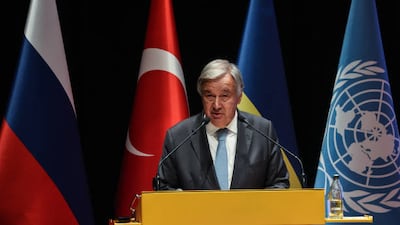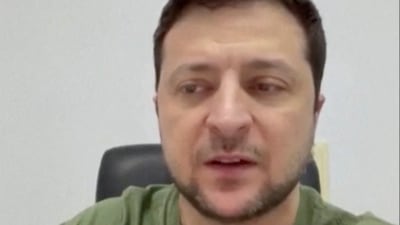The world is at a “maximum moment of danger” and all countries with nuclear weapons must make a commitment to “no first-use”, said UN Secretary General Antonio Guterres on Monday, as he also called for an end to “nuclear sabre-rattling”.
The UN chief called for the same commitment to dialogue and reason that led to the deal that restarted grain and fertiliser shipments from Ukraine and Russia to be applied to “the critical situation” at Europe’s largest nuclear power plant at Zaporizhzhia, where continued shelling and fighting has raised fears of a catastrophe.
“Humanity’s future is in our hands today,” said Mr Guterres as he urged all countries “to recommit to a world free of nuclear weapons and to spare no effort to come to the negotiating table to ease tension and end the nuclear arms race, once and for all”.
The secretary general spoke at a UN Security Council meeting organised by China, which holds the presidency this month, on “promoting common security through dialogue and co-operation”.
Around the world, Mr Guterres said, collective security is being tested as “never before”, pointing to geopolitical divides, conflicts, military coups, invasions, lengthy wars and differences between the world’s great powers, “including at this council”.
He also cited “challenges that were unimaginable to our predecessors — cyberwarfare, terrorism and lethal autonomous weapons”.
“And the nuclear risk has climbed to its highest point in decades,” Mr Guterres said.
Zaporizhzhia nuclear power plant attacked — in pictures
The council meeting took place during the pandemic-delayed conference to review the 50-year-old Treaty on Non-Proliferation of Nuclear Weapons, which is considered the cornerstone of international disarmament efforts.
It is taking place against the backdrop of Russian President Vladimir Putin’s warning after his February 24 invasion of Ukraine that Russia is a “potent” nuclear power and any attempt to interfere would lead to “consequences you have never seen”.
Earlier this year, her announced his decision to put Russia’s nuclear forces on high alert.
Mr Putin has since said that “a nuclear war cannot be won and must never be fought”, a message reiterated by a senior Russian official on the opening day of the conference on August 2.
The treaty sought to prevent the spread of nuclear arms beyond the five original nuclear powers — the US, Russia, China, Britain and France — and eventually achieve a nuclear-free world.
It requires non-nuclear signatory nations not to pursue atomic weapons in exchange for a commitment by the five powers to move towards nuclear disarmament and to guarantee non-nuclear states’ access to peaceful technology for producing energy.
The Chernobyl nuclear disaster 33 years on — in pictures
Gustavo Zlauvinen, president of the treaty review conference, told the Security Council without naming any country that since February, “the NPT faces a raft of challenges, the diversity and scope of which are unlike anything that has come before”.
It should be no surprise, he said, that concerns have grown on the need for urgent action on disarmament.
Mr Zlauvinen, an Argentinian Foreign Ministry official, called “the norm” against using nuclear weapons one of the most important achievements of the post-Second World War era, but said that “it is increasingly threatened”.
He also said that the current global security environment revived the belief that nuclear weapons provide “the ultimate security guarantee”, calling this “an extremely damaging narrative and dangerous for non-proliferation”.
Russia’s UN ambassador Vassily Nebenzia told the council “the international security system is experiencing a profound crisis” and trust between key international players at nearly all the institutions it is based on is at “a critically low level”.
For more than 200 years, he said, western countries have blamed Russia for everything.
Mr Nebenzia accused the US and its allies of “acting in the same reckless and provocative manner in Asia and Africa” as they are in Ukraine, and added “the reckless American scheme involving Taiwan is proceeding in the same vein”.
He said Russia had called for an emergency meeting of the Security Council on Tuesday on what he called Ukrainian provocations at the Zaporizhzhia nuclear plant.
He accused western countries supporting Ukraine of “essentially helping Kyiv in its attempts of nuclear blackmail” while ignoring shelling of the facility by Ukrainian armed forces.
Ukraine has accused Russia of using the plant as a military base and shelling it and its surroundings.
UN chief: 'Humanity one miscalculation away from nuclear annihilation' — video
US ambassador to the UN Linda Thomas-Greenfield told the council that one of the greatest threats to maintaining global peace and security is Russia’s full-scale invasion of its neighbour and fellow member of the UN. She listed diplomatic efforts by the US and many other nations to prevent Moscow’s military action.
“Russia, however, rejected dialogue, discarded established views of sovereign equality, discarded the concept of indivisibility of security and launched a horrific war,” she said.
Ms Thomas-Greenfield took after Russia’s repeated saying that the security of one state cannot come at the expense of another, saying: “Russia’s tortured, full-throated messaging on the supposed threats it faces from its neighbours omits the fact that all nations have the right to choose their security alliances.”
























